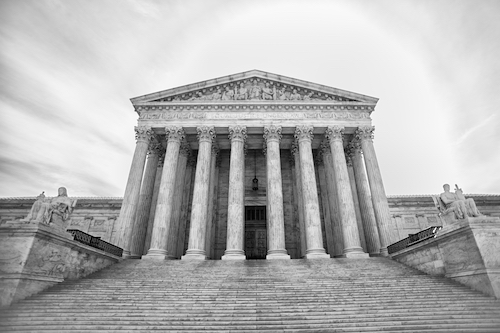Amicus curiae briefs are submitted by non-parties to an appellate case. They present information for the court to consider in deciding the appeal. However, certain rules govern the filing of these briefs. An experienced appellate attorney can explain whether and how to file one. Below we explore these briefs in both California’s state and federal (Ninth Circuit) appellate courts.
Defining the amicus curiae brief
Amicus curiae means “friend of the court.” An amicus curiae brief is not filed by a party to an appeal. Rather, someone outside the case with an interest in its outcome will file one. An amicus curiae brief can be filed in both state and federal appellate courts. Advocacy and public interest groups, trade associations, and other entities may file one of these. So may the government or an interested individual.
These briefs should provide useful information to the court. In other words, they don’t simply side with a party to the appeal. Instead, they should give arguments for the court to evaluate in deciding the appeal. These briefs also must usually indicate what interest the filer has in the case.
If you would like to learn more about what costs are recoverable in the state and federal courts, view this page.
California Court of Appeal rules
At the state appellate level, California imposes certain requirements under the Rules of Court. Fourteen days after the appellant’s reply brief filing, an interested party may request permission to file an amicus brief. An application must be sent to the presiding justice.
The application must state the applicant’s interest in filing a brief. The applicant must also explain how the brief will help the court decide the appeal. Also, the application must identify any party in the appeal who wrote, funded, or prepared the brief. Anyone else who paid for preparation of the brief must also be identified.
The proposed amicus brief is submitted with the application. The cover of the brief must indicate which party in the appeal, if any, the amicus party supports.
If the court permits the amicus curiae brief, any party to the appeal may file an answer to it. The answer must be served on all parties, including the amicus party.
Ninth Circuit (federal) rules
The Ninth Circuit Court of Appeals generally requires someone wishing to file an amicus curiae brief to obtain permission. The U.S. government, an officer or agency, or a state government does not need permission. For everyone else, either the court must allow the brief or all parties must consent. To request the court’s permission, the amicus party must file a motion for leave to file.
Similar to state rules, the motion must indicate the amicus party’s interest in filing the brief. It needs to also state why the brief is desirable and how it will be relevant to the outcome. In addition to complying with other rules, the brief must:
- Identify the amicus curiae party, its interest in the case, and by what authority it files
- Indicate whether it supports any party to the appeal
- State whether it supports affirmance or denial of the trial court decision
- Provide a disclosure statement (under Rule 26.1) if the amicus curiae party is a corporation
- Include a table of contents, page references, and list of authorities cited
- Indicate who wrote or paid for the brief (similar to the California state appellate rule)
- Make an argument for the desired outcome
- Abide by certain length requirements
If the amicus filer supports a particular party, it must wait for that party to file its principal brief. Then, the amicus filer has 7 days to file its brief. If not supporting a party, the amicus party must file within 7 days of the appellant’s or petitioner’s principal brief.
Is an amicus curiae brief a good idea?
In some cases, it’s a good idea to inform the court of how other states or circuits have handled similar issues. It may also be advisable to file if the appellate decision could set a significant precedent. Other reasons to file an amicus curiae brief include:
- The outcome of the appeal affects the interests or rights of the amicus curiae party
- The amicus party has expert knowledge of the subject matter of the appeal
- There is concern the appellate court will not be aware of certain relevant information
- Filing a brief may raise the prominence of the individual or entity involved
Gusdorff Law advises parties who are considering filing amicus curiae briefs. To learn more about them, or to get started on your California appeal, contact us today.
Amicus curiae briefs, commonly known as “friend of the court brief,” are submissions by non-parties in appellate cases. These briefs provide crucial information for the court to consider in deciding an appeal. Governed by specific rules, filing these briefs requires expert knowledge to ensure compliance and effectiveness. An experienced appellate attorney can guide you through the process.
In this post, we will delve into the details of amicus curiae briefs in both California’s state and federal (Ninth Circuit) appellate courts.
Defining the Amicus Curiae Brief
Amicus Curiae Explained
Amicus curiae means “friend of the court.” Unlike briefs submitted by parties directly involved in the appeal, an amicus curiae brief is filed by an individual or entity with an interest in the case’s outcome.
These amicus briefs can be submitted in both state and federal appellate courts by advocacy groups, public interest organizations, trade associations, government entities, or interested individuals.
Purpose of The Friend Of The Court Brief
Amicus curiae briefs aim to provide the court with additional perspectives and information. They do not merely side with one party but present arguments and relevant data to aid the court’s decision-making process. These briefs must also disclose the filer’s interest in the case.
California Court of Appeal Rules
Filing Requirements and Deadlines
At the state appellate level, California imposes specific requirements under the Rules of Court for filing an amicus curiae brief. These rules are designed to ensure that the court receives high-quality, relevant information from interested non-parties.
Understanding and adhering to these requirements is crucial for successfully submitting an amicus curiae brief.
Timeline for Filing
Fourteen days after the appellant’s reply brief filing, an interested party may request permission to file an amicus curiae brief. This 14-day window is critical, as any late submissions may not be accepted by the court.
Interested parties must be diligent in tracking the timeline of the appellate process to ensure their application is timely.
Submitting an Application to the Presiding Justice
To initiate the process, the interested party must submit an application to the presiding justice of the appellate court. This application serves as a formal request for permission to file the amicus curiae brief and must be meticulously prepared to meet the court’s standards.
Content of the Application
The application to file an amicus curiae brief must include several key components to demonstrate the relevance and necessity of the amicus briefs:
Interest Statement
- Detailing the Interest: The application must clearly articulate the applicant’s interest in the case. This involves explaining why the outcome of the appeal is significant to the applicant, whether it be due to direct impact or broader implications for the field in which the applicant operates.
- Relevance to the Case: The interest statement should connect the applicant’s interest directly to the issues being considered in the appeal. This ensures that the court understands the applicant’s perspective and the potential value of their input.
Benefit to the Court
- Explanation of Assistance: The application should provide a thorough explanation of how the amicus curiae brief will assist the court in deciding the appeal. This might include presenting unique legal arguments, offering expertise in a particular area of law, or providing data and analysis that the parties involved may not have included.
- Enhancing the Court’s Understanding: The amicus brief should aim to enhance the court’s understanding of the broader context or specific nuances of the case. This can involve citing precedents, highlighting public policy considerations, or offering comparative legal perspectives from other jurisdictions.
Disclosure of Contributors
- Identification of Contributors: The applicant must identify any party who contributed to writing, funding, or preparing the amicus brief. This transparency ensures that the court is aware of any potential biases or interests behind the amicus curiae submission.
- Funding and Preparation Details: The application must also disclose anyone else who paid for the preparation of the amicus brief. Full disclosure is critical for maintaining the integrity of the amicus curiae process and ensuring that the court can evaluate the impartiality of the information presented.
Additional Requirements
- Proposed Amicus Curiae Brief: The application must be accompanied by the proposed amicus curiae brief itself. The amicus briefs should be formatted according to the court’s specifications, including a cover that indicates which party in the appeal, if any, the amicus supports.
- Comprehensive and Compliant Amicus Brief: The proposed amicus brief should be comprehensive, well-researched, and comply with all applicable rules regarding length, format, and content. This includes a table of contents, references, and a clear articulation of the arguments and information being presented.
- Service of the Amicus Brief: If the court grants permission to file the amicus curiae brief, the applicant must serve the amicus brief on all parties involved in the appeal. This ensures that all parties have the opportunity to respond to the arguments and information provided by the amicus curiae.
Submitting the Proposed Amicus Curiae Brief
The proposed amicus brief must accompany the application, with the cover indicating which party in the appeal, if any, the amicus curiae supports. If the court grants permission, any party in the appeal may file an answer to the amicus curiae brief, serving it on all parties, including the amicus filer.
Ninth Circuit (Federal) Rules
General Requirements
The Ninth Circuit Court of Appeals generally requires permission to file an amicus curiae brief. Exceptions include the U.S. government, an officer or agency, or a state government. Other entities must obtain either the court’s permission or the consent of all parties involved.
Motion for Leave to File
- Interest Statement: The motion must state the amicus party’s interest in the appeal.
- Relevance and Desirability: It should explain why the amicus brief is relevant and desirable for the court’s consideration.
Compliance with Other Rules
The amicus brief must:
- Identify the amicus curiae party and its interest.
- Indicate whether it supports any party.
- State whether it supports affirmance or denial of the trial court decision.
- Include a Rule 26.1 disclosure statement if the amicus curiae party is a corporation.
- Contain a table of contents, page references, and a list of authorities cited.
- Disclose who wrote or paid for the amicus brief.
- Present an argument for the desired outcome.
- Adhere to length requirements.
Timing for Filing
If the amicus filer supports a specific party, it must wait for that party to file its principal brief. Then, the amicus curiae has seven days to file its amicus brief. If not supporting any party, the amicus must file within seven days of the appellant’s or petitioner’s principal brief.
Detailed Benefits of Filing An Amicus Brief
When to Consider Filing
In some cases, filing an amicus curiae brief can significantly impact the appellate court’s decision. Consider filing if:
- The appeal affects the interests or rights of the amicus curiae party.
- The amicus curiae has expert knowledge relevant to the case.
- There is a concern the court may overlook critical information.
- Filing could raise the prominence of the involved individual or entity.
Informing the Court of Broader Implications
Filing an amicus curiae brief can help inform the court of how other states or circuits have handled similar issues. This is particularly useful if the appellate decision could set a significant precedent or influence public policy.
Such amicus briefs can provide the court with comprehensive legal, social, and economic perspectives, which might not be fully represented by the parties directly involved in the case.
Highlighting Legal Expertise and Public Interest
An amicus curiae brief is a platform to showcase the legal expertise and insights of the filing entity. Public interest groups and advocacy organizations often use these amicus briefs to highlight broader societal impacts and to ensure that the court considers these wider implications.
This can be particularly influential in high-stakes cases with far-reaching consequences.
The Role of Amicus Curiae in the Supreme Court
Supreme Court Considerations
The United States Supreme Court often relies on amicus curiae briefs to gain insight into complex issues. These amicus briefs can be instrumental in shaping the Court’s understanding and approach to a case. Amicus curiae briefs in the Supreme Court must comply with stringent rules, including obtaining the court’s permission or the consent of the parties involved.
Supreme Court Rule Compliance
- Court’s Permission: In most cases, amicus curiae must seek the Supreme Court’s permission to file.
- Consent of the Parties: Alternatively, the consent of all parties involved in the case can be obtained.
- Motion for Leave: If the court’s permission is needed, a motion for leave to file must be submitted.
Impact on Supreme Court Decisions
Amicus curiae briefs can significantly influence the Supreme Court’s decisions by providing unique perspectives and in-depth analyses. These amicus briefs can highlight the broader implications of a potential ruling, ensuring that the Court considers all relevant factors before making a decision.
Strategic Use of Amicus Briefs
Building a Strong Case
The strategic use of amicus curiae briefs can strengthen an appellate case by introducing new arguments and evidence that the primary parties may not have presented. This can be particularly important in cases with complex legal or technical issues.
Engaging Expert Counsel
Engaging expert counsel to draft and file an amicus curiae brief ensures that the submission is of the highest quality and adheres to all procedural requirements. Experienced appellate attorneys can provide valuable guidance on the content and strategy of the amicus brief.
Gusdorff Law’s Expertise in Amicus Curiae Briefs
Why Consult Gusdorff Law?
Gusdorff Law specializes in advising parties considering filing amicus curiae briefs. With extensive experience in appellate law, our attorneys provide expert guidance to navigate the complexities of the appellate process.
We ensure that your amicus brief is meticulously prepared, complies with all procedural requirements, and effectively communicates your interests to the court.
Comprehensive Support
We offer comprehensive support throughout the amicus curiae brief filing process, including:
- Initial Consultation: Understanding your interest and objectives.
- Strategic Planning: Developing a clear strategy for the amicus brief.
- Drafting the Amicus Brief: Crafting a compelling and well-researched brief.
- Filing and Compliance: Ensuring compliance with all court rules and deadlines.
Take Action Today
To learn more about amicus curiae briefs or to get started on your California appeal, contact Gusdorff Law today. Our experienced attorneys are ready to assist you in making a significant impact on your appellate case.
Don’t navigate the complexities of amicus curiae briefs alone. Ensure your voice is heard in appellate courts by partnering with experts who understand the intricacies of the process. Contact Gusdorff Law now to discuss your case and explore how an amicus curiae brief can influence the outcome of your appeal.
Our dedicated team is committed to providing you with the best legal support to achieve your objectives. Let Gusdorff Law be your guide through the appellate process, ensuring that your amicus curiae brief makes a powerful and effective contribution to your case.













